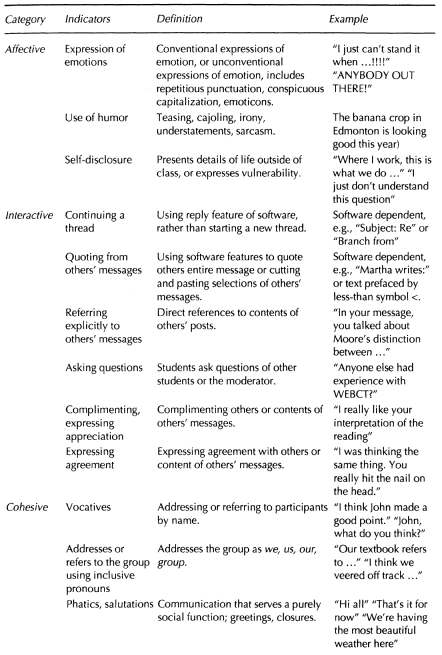
DISCUSSION
QUESTIONS |
MODULE ONE FORUM |
|
1. |
We can begin with what is, apparently, the simplest of questions: What is Online Learning? Sure, it is learning that takes place online. But how is it different from learning that takes place in the classroom? And in what context does online learning take place; that is, how has this whole business of networked communities affected how we teach and learn?
|
2. |
Gillani (2003) argues that four fundamental developments have "rocked the foundations of education in recent years" (p. 3). They are:
Based on what you know now, how do you think online learning can (or can not) address these developments? |
3. |
In chapter 8, Bender (2003) mentions several pro and con "opinions" about online learning. Which "con" opinion seems most legitimate to you? And why? Which "pro" opinion seems most legitimate? Why? |
4. |
One of the key outcomes of this class is that each of you end up with your own theoretical framework appropriate to your own particular interest or focus in online learning (higher ed, K-12, HR, professional development, training, etc.) So, in order to set up that final paper (details on the paper will appear about mid-semester), let us know here what your interest in online learning is and what audience or population is it for which you expect to develop online learning applications/activities? |
MODULE TWO FORUM |
|
1 |
The overview section for Module 2 suggests that with the development of the online learning platform, our communication "tools" have become our learning "places." Do you agree? Does it make sense to talk of the online class as having spatial and temporal qualities? Do you feel as if you are in a shared virtual space here? Does this even matter? Why or why not? |
2 |
As we digital immigrants increasingly learn "DSL," what, if anything, might we lose? What, if anything, might we gain? |
3 |
Select one characteristic of a successful online learner (one that no one else has selected). Tell why that characteristic is important. Can you think of specific ways an online course design can nurture that characteristic? Can you think of ways an online course design can impede that characteristic? Try to answer this question based on the population you intend to serve (K-12, higher ed, professional development, etc.) |
4 |
Examine again the characteristics of successful online learners found in our readings. Which two characteristics do you think are strongest in you? Which two characteristics do you think are weakest in you? |
MODULE THREE FORUM |
|
1 |
Select any one of the several conclusions/observations reported in Swan & Shea about the social process of learning or the development of virtual learning communities and use that observation to analyze any one of (or all) of the discussion threads in class so far. Has this class discussion (community?) born out the particular theory/observation you selected? If so, how? If not, why not? |
2 |
Use the categories listed in table below (reproduced from the online article by Rourke, Anderson, Garrison, and and Archer ) and:
Reproduce just that portion of the post that provides the indicator, then tell what forum, what thread, and what date. Do you see any patterns developing in this class?
|
3 |
Does the Dynamic Model of Online Interaction Learning Theory produced on page 34 of Learning Together Online make sense to you? If so, what in particular do you like about it? Do you find the model confusing? If so, how might you make it better? |
MODULE FOUR FORUM |
|
1 |
Create your own case study (or learning situation) appropriate to the field you are in (or expect to be in) where the solution is to use a behavioral theoretical approach. First:
Second, describe how you would design an eLearning environment to effectively solve the problem. Assume you have the technical skills to do this. Third, explain why a behavioral approach is appropriate for this situation. |
2 |
Create your own case study or learning situation appropriate to the field you are in (or expect to be in) where the solution is to use a cognitive theoretical approach. First:
Second, describe how you would design an eLearning environment to effectively solve the problem. Assume you have the technical skills to do this. Third, explain why a cognitive approach is appropriate for this situation. |
MODULE FIVE FORUM |
|
| 1 | Create your own case study (or learning situation) appropriate to the field you are in (or expect to be in) where the solution is to use either a social or psychological theoretical approach. First: assume, for instance, someone (a teacher, principal, HR Director, Dean, etc.) has come to you and asked you to design an online learning activity that meets a particular educational need or solves a particular learning problem;. briefly outline the need or problem Second, describe how you would design an eLearning environment to effectively solve the problem. Assume you have the technical skills to do this. Third, explain why the social or psychological approach you selected is appropriate for this situation. |
MODULE SIX FORUM |
|
| 1 | As noted in the announcement, by the end of the week, you will be given an opportunity to evaluate this class anonymously. But here, in this discussion board, we'd like to include a tried and true evaluation prompt. Write a letter to the students who will be taking this course next semester. Tell them about your experience with this class. The things you talk could include your surprises, successes, disappointments, problems. You can warn them, let them know what to watch out for. You can let them know what you thought were the best things about the class. The worst things. What worked. What didn't. |
